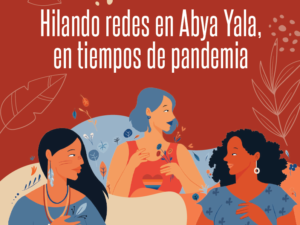Gender and land defense in Abya Yala in times of pandemic

“In this new global context, the compilation of struggles and the essential role of women in the defense of territories, the specificities and damages that they experience in socio-environmental conflicts, become relevant…”
Latin American Network of Women Defenders of Social and Environmental Rights, 2020 annual report
Women are dealing with the compounding effects of the COVID-19 pandemic while nation-states further entrench large-scale resource extraction in the name of development across Abya Yala. In response and as outlined in their recently published annual report, the Red Latinoamericana de Mujeres Defensoras de Derechos Sociales y Ambientales (Latin American Network of Women Defenders of Social and Environmental Rights) continues to uphold a global outlook, rooted in local feminisms, that relies on collective ties to confront the differential impacts of extractivism.
State-imposed public health protocols have done more to negatively affect bodies-territories-land than to contain the spread of the coronavirus. Opportunities under informal economies have decreased for women and the amount of care work expected of them has increased. Gender-based violence has escalated not just at home but also against women land and water defenders; the latter corresponds to the various new extractive-friendly governments that have come into power in the region. An opaque context riddles Latin America since identifying the impacts of extractive projects on communities and their rights is becoming harder due to alliances between governments, armed groups, and companies. The strengthening of these collusive bonds is often an obscured economic and political effect of the COVID-19 pandemic as different levels of government are restricting civil liberties under the guise of public health. Some governments are using enforced disappearance, arbitrary detention, and criminalization to control communities and the defense of territories.
The Latin American Network of Women Defenders of Social and Environmental Rights arrived at their conclusions through a territorial diagnostic, which was one of their many in-person and virtual activities for 2020. Such a diagnostic was made possible by the Network’s regional and local emphasis on the differential impacts of resource extraction that considers but is unbound by geopolitical borders and nationalist motives. The Network kicked-off 2020 with two in-person trips: a visit by two women land defenders from Brazil and El Salvador to Ecuador to meet with local communities resisting extractivism, and a trip by Network members to El Salvador and Guatemala to strengthen their Central American ties. Due to the pandemic, the Network shifted much of their work online and organized a series of online gatherings from June to December that brought together women land defenders from Abya Yala, Africa, and Asia. The Network also focused on continental advocacy efforts and finding new ways of responding to gender-based environmental violence.
Their annual report exemplifies the centrality of gender justice to ecological justice. As the Network writes of themselves and others: “women human rights and environmental defenders take care of our bodies as territories and of our territories as part of the biosphere that we inhabit, that is, our place for life, for ourselves and our future generations.”
The Latin American Network of Women Defenders of Social and Environmental Rights is coordinated by Acción Ecológica (Ecuador), a KAIROS global partner organization.
Read the Network’s annual report in Spanish in PDF format.








